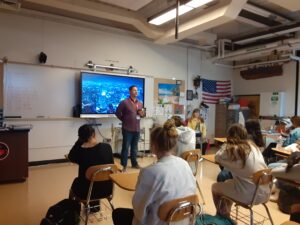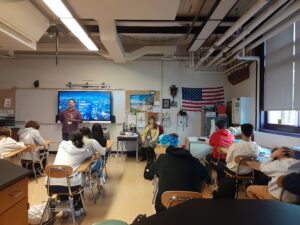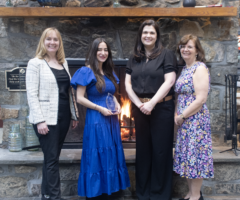 There has been a national surge in school-based mindfulness training, driven by research supporting its multiple benefits for students. Those benefits are why Briarcliff High School Social Worker Tim Pellegrin presents mindfulness lessons to students that enable them to cultivate self-awareness, resilience and compassion for themselves and others, as well as build the ability to focus.
There has been a national surge in school-based mindfulness training, driven by research supporting its multiple benefits for students. Those benefits are why Briarcliff High School Social Worker Tim Pellegrin presents mindfulness lessons to students that enable them to cultivate self-awareness, resilience and compassion for themselves and others, as well as build the ability to focus.
Mr. Pellegrin’s lessons, developed as a curriculum by the organization Mindful Schools, are all related to mindfulness and can often tie into the curriculum of the ninth-grade biology classes, where they are held.
“Some lessons are about understanding our thoughts and emotions or about cultivating kindness towards ourselves and others, and some directly relate to the biology curriculum so they enhance what students are already learning,” Mr. Pellegrin said.
The lessons, which take place roughly every other week for 15-20 minutes on average, relate to the biology curriculum in several ways. For example, when students are learning about the respiratory system in class, they can practice breathing exercises.
Before the break, students in Kim Dyer’s biology class did just that: they had a mindfulness lesson with Mr. Pellegrin and practiced breathing and paying attention to their breaths.
Mr. Pellegrin began the class with a basic breathing exercise; he rang a bell to let students know the exercise had begun and everyone closed their eyes. A few minutes later he rang the bell again to signal that the exercise was coming to an end.
 “We are practicing observing our breath today while also observing how our thoughts affect our feelings,” he said to the students. “Today we will look at the tendency of our minds to move from the present moment, when we are focused on our breath, to something else. Our minds tend to jump around and we often find ourselves thinking of the past or the future.”
“We are practicing observing our breath today while also observing how our thoughts affect our feelings,” he said to the students. “Today we will look at the tendency of our minds to move from the present moment, when we are focused on our breath, to something else. Our minds tend to jump around and we often find ourselves thinking of the past or the future.”
Mr. Pellegrin pointed out that we can get distracted and begin to think about something someone said to us, for example.
“Now we will do an exercise where we will be focused on our breathing, but we will try to notice when our minds wonder,” Mr. Pellegrin said. “Try to notice if you jump to the future or to the past and once you notice that, you can label it past or future and then bring your attention back to the present and to your breathing.”
A ‘worry thought’ can be labeled as such and so can an ‘anger thought.’ A ‘planning thought’ can be labeled as ‘planning,’ Mr. Pellegrin said. “Labeling our thoughts helps us understand the type of thinking we do, and can help us more easily return to the present moment.”
He rang the bell and students closed their eyes and did the exercise.
When the exercise was over he asked students if they noticed that they were going to the past or the future and if they were able to get back to the present and he assured them that getting distracted and having your mind wander is something we all do.
“There is nothing wrong with your mind drifting away,” he said. “The most important part is to notice it has drifted and to bring it back to the present moment, even if it again drifts away after one second. The noticing and bringing back is what builds the ability to focus.”
Mr. Pellegrin shared that he himself tends to wander during this exercise and that this can vary depending on the day or time.
“Sometimes there can be something distracting in the room like a noise. We have distractions all around us, and that is part of life. We are just observing and practicing to understand our thinking and ability to focus. Any time we focus on one thing at a time, we are building that focusing muscle,” he said.
As mentioned, the mindfulness lessons, which are being taught through biology for the first time, are held at all ninth-grade biology classes at the school so all ninth graders can participate in them, but Mr. Pellegrin hopes to branch out next year.
“We hope to expand this work and have student ambassadors, for example. We plan to integrate these life skills more fully into the high school experience,” he said.






